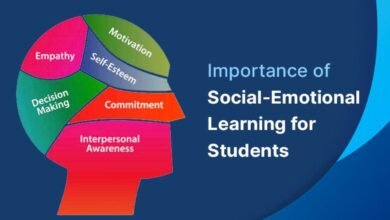The Future of Online Learning: Trends and Innovations

Online learning has rapidly evolved from a niche market into a dominant force in education, driven by technological advancements and shifting educational paradigms. The global pandemic accelerated this shift, bringing online education to the forefront and expanding its reach. As we look toward the future, it’s crucial to explore the emerging trends and innovations that are shaping the landscape of online learning. This article delves into these developments, highlighting how they will impact learners, educators, and institutions alike.
The Rise of Adaptive Learning Technologies
One of the most significant trends in online education is the rise of adaptive learning technologies. These systems use data-driven algorithms to tailor educational experiences to the needs of individual learners. Unlike traditional one-size-fits-all approaches, adaptive learning platforms adjust in real-time, offering personalized content based on the learner’s performance and engagement levels.
Adaptive learning can significantly enhance the effectiveness of online education by addressing individual learning gaps and pacing. For instance, if a student struggles with a particular concept, the system can provide additional resources and exercises targeted to that area. Conversely, if a learner demonstrates proficiency, the system can advance them to more complex material. This personalized approach not only improves learning outcomes but also keeps students motivated by providing a more engaging and relevant learning experience.
Gamification: Making Learning Engaging and Fun
Gamification, the integration of game-design elements into educational contexts, is another trend gaining momentum in online learning. This approach leverages the principles of game mechanics—such as rewards, challenges, and competition—to make learning more interactive and enjoyable.
Incorporating gamification into online courses can significantly boost student engagement and motivation. For example, earning badges or points for completing assignments and participating in discussions can create a sense of achievement and encourage continued effort. Additionally, game-based learning environments can provide immediate feedback, which is crucial for reinforcing concepts and fostering a growth mindset. As online education continues to evolve, gamification will likely become a standard component, enhancing the overall learning experience.
The Integration of Artificial Intelligence
Artificial Intelligence (AI) is transforming various aspects of online learning, from course creation to student support. AI-driven tools can automate administrative tasks, such as grading and feedback, freeing up educators to focus on more strategic elements of teaching. Additionally, AI can provide real-time analytics on student performance, helping educators identify at-risk students and tailor their interventions accordingly.
AI-powered chatbots and virtual assistants are also becoming common in online learning environments. These tools can provide instant support to students, answer questions, and guide them through the learning process. As AI technology continues to advance, its integration into online education will likely become more sophisticated, offering even more personalized and efficient learning experiences.
Virtual and Augmented Reality in Education
Virtual Reality (VR) and Augmented Reality (AR) are revolutionizing the way students interact with content in online learning. VR creates immersive environments that can simulate real-world scenarios, while AR overlays digital information onto the physical world. Both technologies offer unique opportunities for experiential learning and engagement.
For example, VR can transport students to historical events, distant planets, or complex scientific environments, providing a hands-on learning experience that is often difficult to achieve through traditional methods. AR, on the other hand, can enhance textbooks and online resources by adding interactive elements that make learning more dynamic and visually stimulating. As these technologies become more accessible and affordable, their adoption in online education is expected to grow, offering richer and more interactive learning experiences.
The Expansion of Microlearning and Modular Courses
Microlearning, which involves delivering content in small, manageable chunks, is becoming increasingly popular in online education. This approach caters to the modern learner’s preference for quick, focused learning sessions that can be easily integrated into a busy schedule. Microlearning modules are often designed to address specific learning objectives, allowing students to acquire and apply knowledge in a short amount of time.
Modular courses, which break down larger subjects into smaller, standalone units, are also gaining traction. These courses provide flexibility and allow learners to customize their educational journey according to their interests and needs. By offering a variety of modules, educational institutions can cater to diverse learning preferences and enable students to build a personalized learning path.
The Emergence of Blockchain for Credentialing and Assessment
Blockchain technology, known for its role in cryptocurrencies, is finding applications in online education, particularly in credentialing and assessment. Blockchain can provide a secure, transparent, and tamper-proof system for verifying educational credentials and achievements. This technology allows institutions to issue digital certificates and diplomas that can be easily verified by employers and other educational entities.
Furthermore, blockchain can facilitate the creation of decentralized and verifiable assessments, ensuring the integrity of evaluation processes. This can help address issues related to academic dishonesty and ensure that qualifications are accurately represented. As the adoption of blockchain in education grows, it is likely to play a significant role in shaping the future of online learning.
The Growing Importance of Soft Skills and Lifelong Learning
As technology continues to advance, the importance of soft skills—such as communication, critical thinking, and problem-solving—becomes increasingly apparent. Online learning platforms are beginning to place more emphasis on these skills, recognizing their value in a rapidly changing job market. Courses and programs that focus on developing soft skills are becoming more prevalent, helping learners prepare for the demands of the modern workforce.
Additionally, the concept of lifelong learning is gaining traction. The need for continuous skill development and professional growth is driving demand for online learning opportunities that support ongoing education. Whether through microcredentials, professional development courses, or upskilling programs, online education is playing a crucial role in enabling individuals to stay competitive and adaptable in their careers.
The Future of Online Learning: A Collaborative and Inclusive Space
Looking ahead, the future of online learning is poised to be more collaborative and inclusive. Advances in technology are making it easier to create and participate in online learning communities, where students and educators from around the world can connect and collaborate. These communities provide opportunities for cross-cultural exchange, peer learning, and collective problem-solving.
Moreover, efforts to make online education more inclusive are gaining momentum. Institutions are working to ensure that online learning is accessible to individuals with diverse needs and backgrounds. This includes developing courses and platforms that accommodate different learning styles, languages, and accessibility requirements. By fostering a more inclusive and collaborative online learning environment, we can ensure that education is accessible to all and that learners from diverse backgrounds have the opportunity to succeed.
Conclusion
The future of online learning is bright, characterized by a blend of technological innovations and evolving educational practices. Trends such as adaptive learning technologies, gamification, AI integration, VR and AR, microlearning, blockchain, and a focus on soft skills are shaping the way education is delivered and experienced. As these innovations continue to develop, they will enhance the effectiveness and accessibility of online learning, offering learners and educators new opportunities for growth and engagement. Embracing these trends and innovations will be key to navigating the evolving landscape of education and preparing for a future where learning is more personalized, interactive, and inclusive than ever before.



